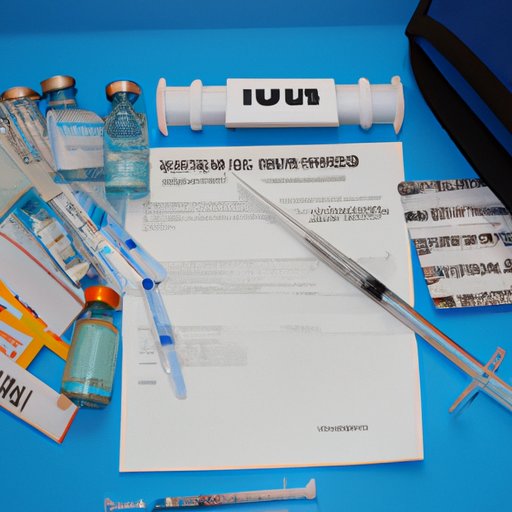Introduction
Travelling with insulin can be a stressful experience, particularly when it comes to air travel. It’s important to understand the regulations and requirements of different airlines in order to ensure that your medication is safe and secure during your travels. This article will provide an overview of airline policies regarding insulin and other medications, tips for carrying medications on a plane, and advice for talking to your doctor about special instructions for your trip.

Airline Policies Regarding Insulin and Other Medications
When travelling with insulin, it’s important to research different airlines and their policies regarding medications. According to the Federal Aviation Administration (FAA), “medication is allowed in both carry-on and checked baggage. Medication in liquid form is allowed in carry-on bags in excess of 3.4 ounces in reasonable quantities for the flight. It is not necessary to place medically required liquids in a zip-top bag.”1 It’s also important to check the specific regulations of the airline you are flying with, as each airline may have its own set of rules.
Carrying Medications on a Plane
When travelling with insulin, it’s best to keep the medication in your carry-on bag. This will ensure that the medication is easily accessible and protected from extreme temperatures or other environmental factors. Additionally, it’s a good idea to use an insulated bag or ice pack to keep the insulin at a stable temperature. The FAA states that “small coolers or gel packs containing medications are permitted onboard and do not need to fit within a quart-sized bag.”2

Bringing Enough Insulin for Your Trip
It’s important to bring enough insulin for your entire trip, including any unexpected delays or cancellations. One way to make sure you have enough insulin is to calculate exactly how much you will need based on the length of your trip and the type of insulin you use. If you run out of insulin while you’re away, it’s possible to get a refill from a local pharmacy if you have a prescription. However, this can be a lengthy process, so it’s best to plan ahead and bring enough insulin for your entire trip.
Talking to Your Doctor
Before you travel, it’s important to talk to your doctor about special instructions for your trip. Your doctor may recommend certain accommodations for potential delays or cancellations, such as bringing extra supplies of insulin or other medications. Additionally, your doctor can provide information about any special requirements for travelling with insulin, such as needing a doctor’s note or proof of prescription.

Bringing a Letter from Your Doctor
A letter from your doctor can be helpful when travelling with insulin. The letter should include information about your diagnosis, the type of insulin you’re using, and the dosage. Additionally, the letter should indicate that the insulin is medically necessary and that you need to keep it with you at all times. Having a letter from your doctor can help you get through security more quickly and easily.
Conclusion
Travelling with insulin can be a challenging task, but with the right preparation and knowledge, it can be done safely and securely. It’s important to research airline policies regarding medications, understand regulations, and carry medications in a carry-on bag. Additionally, it’s important to bring enough insulin for your entire trip and to talk to your doctor about special instructions for travel. Bringing a letter from your doctor can also help you get through security more easily. With the right preparation, travelling with insulin doesn’t have to be a stressful experience.
(Note: Is this article not meeting your expectations? Do you have knowledge or insights to share? Unlock new opportunities and expand your reach by joining our authors team. Click Registration to join us and share your expertise with our readers.)
